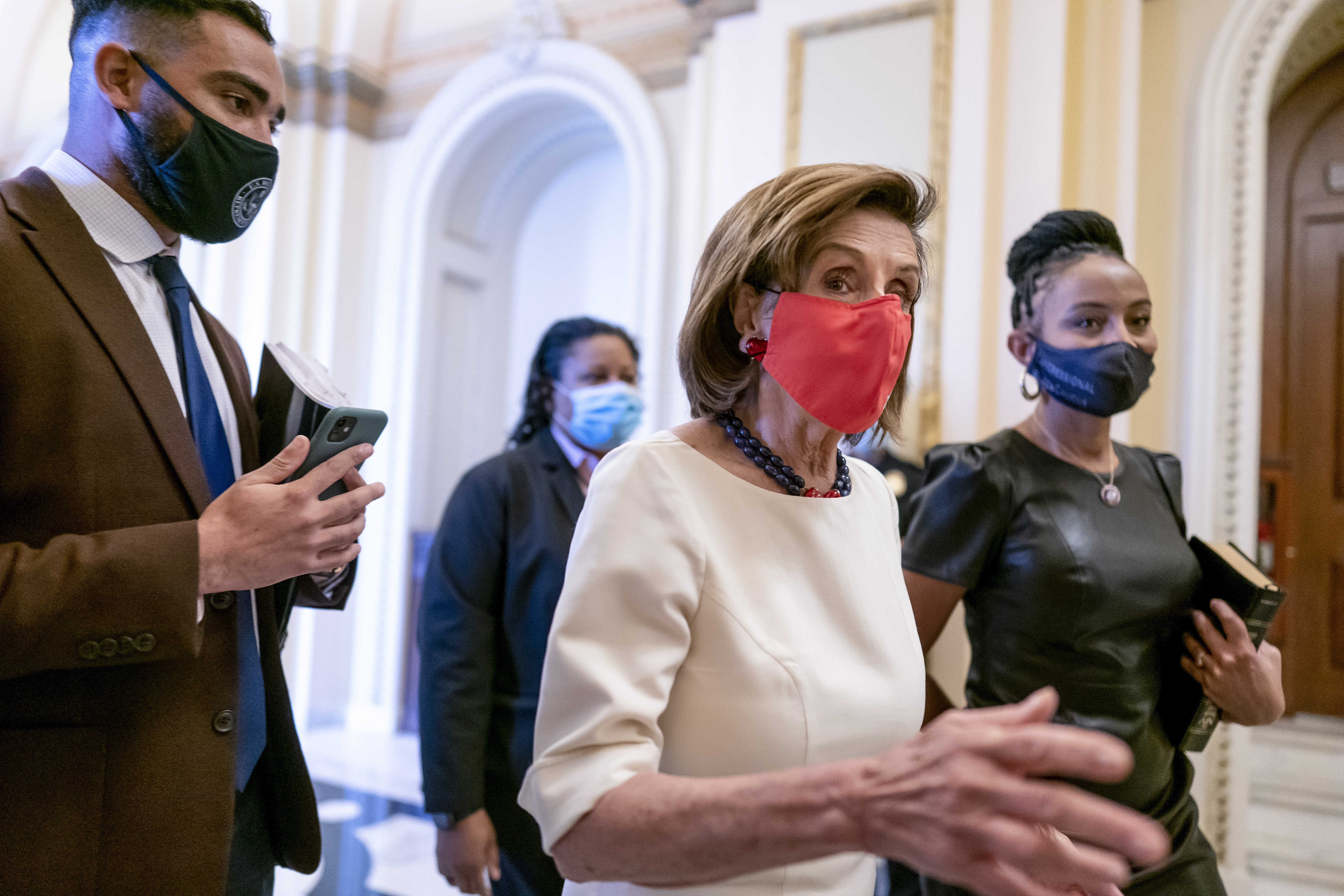As Democrats undergo a self-evaluation following off-year election beatings in Virginia and New Jersey, all the attention now turns to 2022, with Pennsylvania’s gubernatorial and U.S. Senate results likely to reshape both local and national politics.
The two high-powered races, which feature a rare open Senate seat because of Republican Pat Toomey's pending retirement, will offer a glimpse into Democrats' efforts to retain power in Washington.
Pennsylvania voters will play a crucial role nationally as the Toomey seat could singularly decide control of Congress, while both Democrats and Republicans see the governor's office as crucial to political power at the state level for the next four years. Current Gov. Tom Wolf, a Democrat, cannot run for a third term.
A Republican victory would likely give the party control of both executive and legislative branches of state government, with the GOP expected to remain in control of the General Assembly next year. Liberals see the governorship as a check on a full-out conservative agenda in a state where there are a million fewer registered Republicans than Democrats.
"They’re both highly important because the Senate race might determine who controls the U.S. Senate," longtime Pennsylvania Republican political strategist Joe Watkins said.
"On the gubernatorial side, it’s important because remember not long ago, we had an unwritten system. For 50 years, before (former one-time Gov.) Tom Corbett lost re-election in 2016, it would be two terms for one party, then it would casually go to the other side. Then Corbett loses after one term. The question becomes: what is the appetite of Pennsylvania?"
The open races have attracted lots of political hopefuls seeking the two most prestigious elected offices in the United States.
Watkins said if the state's political party leadership do not throw their support behind a candidate before the primary election in May, "It'll be a slugfest."
So far, only one candidate in either the Senate or governor's race appears likely to receive a party endorsement: state Attorney General Josh Shapiro, a Democrat running for governor.
Tough primary battles would force the large field of candidates to take sides on issues dominating local and national politics, including abortion rights, gun control, climate change, stagnant wages, voting rights and criminal justice reform.
A Democratic governor would have veto power over Pennsylvania's Republican-controlled legislature. Nationally, a Democratic senator elected to replace Toomey would bolster President Joe Biden’s chances to advance a liberal agenda, while a Republican senator could signal GOP gains in other parts of the country.
"It’s a huge Senate race," Pennsylvania Democratic Party senior advisor Jack Doyle said. "Depending on what happens, it could dictate who controls the Senate. It’s probably the best chance of a pickup for the Democrats."
One thing's for sure: Tens of millions of dollars will be spent by candidates and third-party groups in both yearlong races that are already unfolding before Pennsylvania voters' eyes. What happened in the Nov. 2, 2021, elections across the country will likely ramp up efforts by both major political parties. Republicans came away from victories, including a race for a seat on Pennsylvania's Supreme Court, with a gameplan for 2022 while Democrats may have to spend more money in order to re-energize supporters, political observers said this week.

The Race to Replace Outgoing Gov. Tom Wolf
Shapiro, a twice-elected attorney general from Abington Township outside Philadelphia, is widely assumed to be a lock for the Democratic nomination. His party appears less interested in a tough primary fight over the next few months in hopes that Republicans fighting for the nomination leave the eventual winner bruised and battered.
"That's a hard mountain to climb for Republicans," Watkins, the Republican strategist, said Tuesday. "If it’s too much of a bloodbath, it’s hard for the party to coalesce around the victor before the general election in November. That’s a pitfall."
The two highest-profile Republican candidates so far to announce a run for governor are former U.S. Rep. Lou Barletta and former U.S. Attorney for the Eastern District of Pennsylvania Bill McSwain.
Barletta has said his motivation to run for governor stemmed from Wolf’s handling of the COVID-19 pandemic, and he’s come out as an opponent of vaccine mandates.
An early supporter of former President Donald Trump, Barletta has declined to admit Biden fairly won the 2020 election, a nod to Trump’s disproven claims that the election was rigged.
McSwain, a former federal prosecutor nominated by Trump, came to prominence in part due to constant quarrels with Philadelphia’s Democratic District Attorney Larry Krasner, whom he accused of being soft on crime.
Democrats see the governor's office as a crucial check on a Republican-controlled state legislature that has opposed expanding renewable energy incentives and carbon emission reductions, rejected gun control measures and suggested scaling back mail-in ballot voting. A Democratic Party official also suggested that abortion rights in Pennsylvania could be vulnerable with a Republican governor.
“A Democratic governor is what’s stopping Pennsylvania from potentially becoming the next Texas,” Pennsylvania Democratic Party advisor Marisa Nahem said.
But while Shapiro and Wolf are aligned on many of the same policies, including their stance on abortion, Shapiro recently broke with Wolf on the centerpiece of the governor’s plan to fight climate change – regulations that would make Pennsylvania the first state to impose a price on carbon dioxide emissions from power plants.
Watkins said Shapiro could find it difficult to remain in step with both Wolf and Biden if voters sour on the governor and president in the months ahead.
"If there is a strong dislike with President Biden, and Gov. Wolf’s poll numbers as he heads into final year in office are not strong, it makes it tough for Shapiro to tie himself to them."
Republicans will have their own tightrope to walk heading into the May primary and November general election next year.
McSwain, for instance, in courting former President Donald Trump's endorsement, has called Pennsylvania’s 2020 election process “a partisan disgrace.”
There’s also Joe Gale, a longtime Trump backer who sits on the Montgomery County Board of Commissioners, who is running for governor as someone bucking the GOP establishment. Gale stirred calls for his resignation in 2020 when he described the Black Lives Matter movement as a "radical left-wing hate group" protesting a "bogus narrative of systemic police brutality and white racism."
The Senate Race to Replace Retiring Pat Toomey
In the Senate race, one Democrat stands tall – figuratively and literally – above other candidates.
John Fetterman, the tattooed Pennsylvania lieutenant governor who is regularly listed as anywhere between 6 feet, 6 inches and 6 feet, 8 inches tall, is a proponent of legalizing marijuana, raising the minimum wage to $15 an hour, expanding protections for the LGBTQ community and ending man-made climate change. Notably, though, he does not support a ban on natural gas drilling.
Fetterman garnered a national profile last year with regular cable TV appearances in which he excoriated legislators, including Republicans from his state, and others who questioned the legitimacy of the presidential election.
That has helped him raise more than $9.2 million for his campaign, according to the most recent Federal Election Commission filings, far outpacing his other Democratic challengers.
The next-highest fundraiser in the Democratic field is Rep. Conor Lamb, who announced his Senate campaign after Fetterman and has raised more than $2.6 million.
Lamb made national headlines after a brawl nearly broke out in the U.S. House of Representatives during a speech in which he said the deadly Jan. 6 Capitol riot was inspired by Republican “lies” about the 2020 presidential election.
Lamb campaigned with Biden in 2018 during Lamb’s run for Congress, with the president at the time likening Lamb to his son, Beau. Lamb shares many of the centrist values as Biden, but he has embraced some progressive positions like scrapping the 60-vote minimum threshold to advance most major Senate legislation.
Other prominent Democratic candidates include Montgomery County Commissioner, Dr. Valerie Arkoosh, who caught the attention of Southeastern Pennsylvania with her frequent briefings as the early stages of the COVID-19 pandemic ravaged her county; and Rep. Malcolm Kenyatta, who became the first openly gay person of color to join the Pennsylvania statehouse and is staking his candidacy on his working-class North Philadelphia background.
The Republican field is equally deep. One of the top fundraisers so far, Jeff Bartos, is a businessman from Montgomery County in suburban Philadelphia. He had raised roughly $2.2 million as of early October.
Bartos, who in 2018 lost the lieutenant governor’s race to Fetterman, told NBC10 he was inspired to run for the Senate after seeing the devastating effects of the pandemic on small businesses, a reality that inspired him to help launch the nonprofit PA 30 Day Fun, which helps small business owners.
Bartos says he supports lower taxes and decreased regulations. He’s attempting to carve out a more moderate position in the race, though he did say Toomey, whom he would replace, was not conservative enough on guns. Toomey has been one of the rare congressional Republicans to support moderate restrictions on firearms.
Another candidate is Sean Parnell, a former Army officer and author from western Pennsylvania who has received Trump's endorsement. Parnell, however, is currently mired in a divorce and custody battle in which his wife has alleged he violently beat her and their children.
Parnell has denied the allegations, but Bartos has capitalized on the controversy by running attack ads against his primary opponent in which he noted Parnell's wife previously sought restraining orders against him. Both orders were later expunged.
The field also includes Kathy Barnette, an author and television political commentator from southeastern Pennsylvania; and Carla Sands, a former real estate investor who has donated $3 million to herself.



